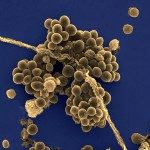Link to Pubmed [PMID] – 7557308
FEMS Microbiol. Lett. 1995 Aug;131(1):41-5
An internal fragment representing approximately 85% of sod genes from seven Gram-positive bacteria was amplified by using degenerate primers in a polymerase chain reaction assay. The DNA sequences of sod polymerase chain reaction products from Clostridium perfringens, Enterococcus faecalis, Enterococcus faecium, Lactococcus lactis, Staphylococcus aureus, Streptococcus agalactiae, Streptococcus pneumoniae, and Streptococcus pyogenes were determined. Comparisons of their deduced amino acid sequences with those of the corresponding regions of the SOD proteins from Bacillus stearothermophilus, Listeria monocytogenes, and Streptococcus mutans revealed strong relatedness. Phylogenetic analysis of SOD peptides showed that members of the genera Streptococcus and those of the genera Enterococcus constitute two well-supported monophyletic groups. The method described in this study provides a means for easy recovery of sod genes and the construction of sod mutants of various Gram-positive pathogens.

